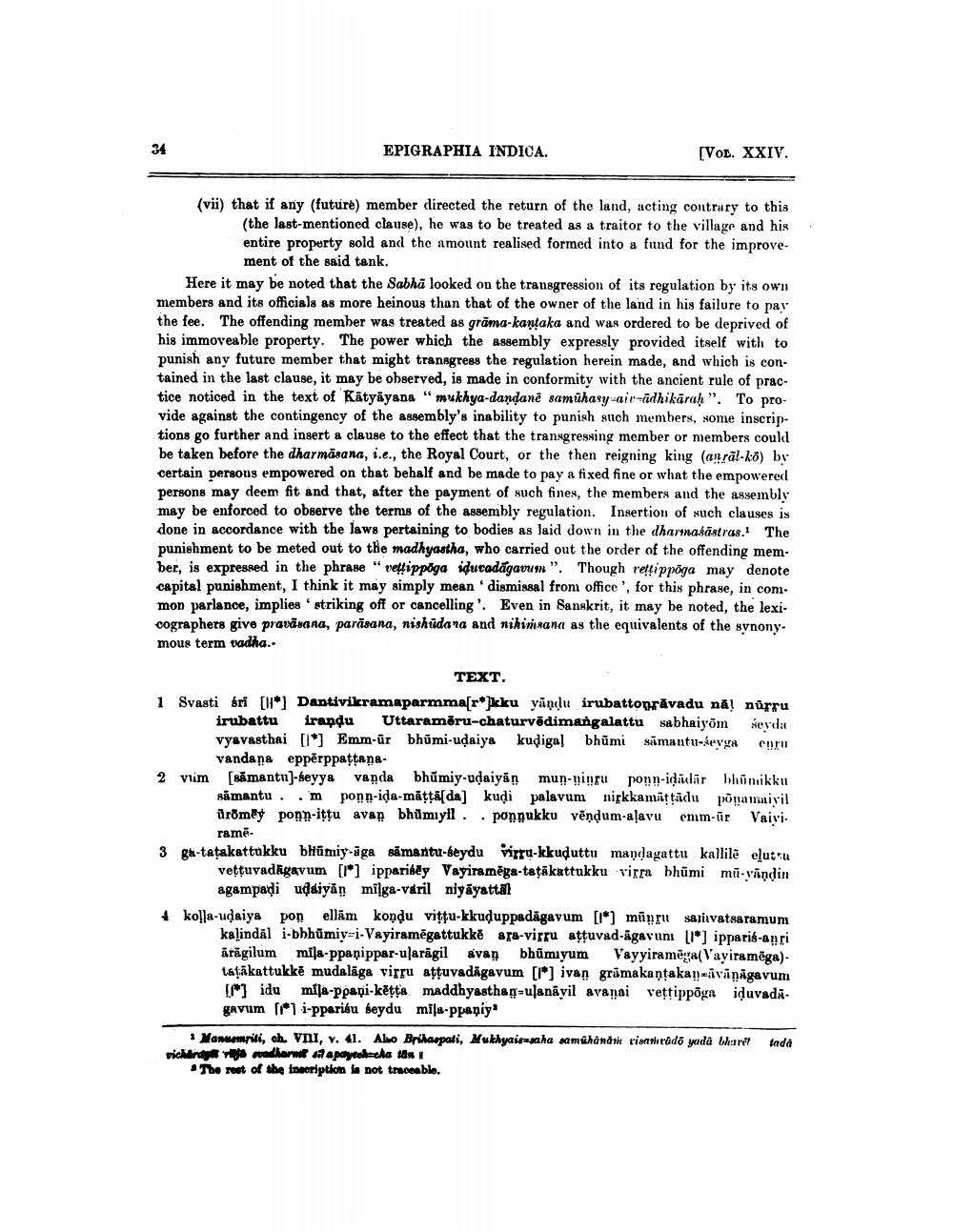________________
EPIGRAPHIA INDICA.
[VOL. XXIV.
(vii) that if any (future) member directed the return of the land, acting contrary to this
(the last-mentioned clause), he was to be treated as a traitor to the village and his entire property sold and the amount realised formed into a fund for the improve
ment of the said tank. Here it may be noted that the Sabhā looked on the transgression of its regulation by its own members and its officials as more heinous than that of the owner of the land in his failure to pay the fee. The offending member was treated as grāma-kantaka and was ordered to be deprived of his immoveable property. The power which the assembly expressly provided itself with to punish any future member that might transgress the regulation herein made, and which is contained in the last clause, it may be observed, is made in conformity with the ancient rule of practice noticed in the text of Kätyāyana " mukhya-dandane samühasyair-ūdhikāraḥ ". To provide against the contingency of the assembly's inability to punish such members, some inscriptions go further and insert a clause to the effect that the transgressing member or members could be taken before the dharmāsana, i.e., the Royal Court, or the then reigning king (anrāl-ko) by certain persons empowered on that behalf and be made to pay a fixed fine or what the empowered persons may deem fit and that, after the payment of such fines, the members and the assembly may be enforced to observe the terms of the assembly regulation. Insertion of such clauses is done in accordance with the laws pertaining to bodies as laid down in the dharmaśāstras. The punishment to be meted out to the madhyastha, who carried out the order of the offending member, is expressed in the phrase "vettippöga iduradagavum". Though rettippõga may denote capital punishment, I think it may simply mean dismissal from office', for this phrase, in common parlance, implies striking off or cancelling'. Even in Sanskrit, it may be noted, the lexicographers give pravävana, parāsana, nishüdana and nikiri sana as the equivalents of the synony. mous term vadha..
TEXT. 1 Svasti sri [11] Dantivikramaparmmarkku yandu irubattoprávadu nā! nurru
irubattu irandu Uttaramoru-chaturvēdimangalattu sabhaiyōm sevda vyavasthai [*] Emm-ür bhūmi-udaiya kudigal bhūmi simantu-sevga coru
vandana eppērppattana2 viim samantn)-seyya vanda bhūmiy-udaiyān mun-ningu ponn-idādar bhumikku
Hämantu . . m ponn-ida-māçtı[da] kudi palavum nickkamättādu põnamaiyil Ürömêy ponn-ittu avan bhūmıyll . . poppukku vēndum-aļavu emm-ir Vaiyi.
rame3 ga-tatakattukku bhūmiy-aga samantu-beydu virru-kkuduttu mandayattu kallile elutru
vettuvad igavum [1] ipparibèy Vayiraméga-taţäkettukku virra bhūmi mū vandin
agampadi uậdiyāņ mīlga-varil niyāyattal # koļla-udaiya pon ellām koņdu vittu-kkuduppadägavum [*] mūnru sariivatsaramum
kalindal i-bbhūmiy-i-Vayiramēgattukke afa-virru attuvad-agavum [18] ipparis-apri ärāgilum mila-ppanippar-ularăgil avan bhūmiyum Vayyiramena (Vayiramēga). tațākattukke mudalāga virru aţtuvadāgavum [lo] ivan grāmakantakan ivanagavum M idu mila-Ppapi-kēţta maddhyasthan-ulanäyil avanai vettippöga iduvadagavum f1 i-pparibu beydu mila-ppaniy
1 Manuemriti, oh. VNI, v. 41. Aloo Brihaspati, Mukhyaisasaha samihanan riantado yuda Wartenda vich radikan apayrolla tox
. The rest of the incription is not traceable.




